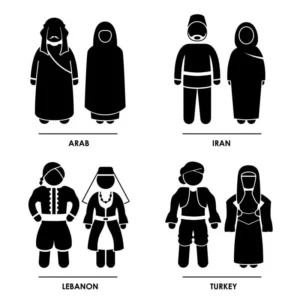Learning Arabic requires an understanding of Arabic cultural etiquette and it doesn’t require only memorizing vocabulary and syntax. It includes the social mores, cultural practices, and customs of Arabic-speaking cultures, all of which significantly impact interpersonal interactions and communication.
Arabs are renowned for being friendly and giving people a generous mentality. To respect their culture, one should adhere to several societal mores and manners.
Introduction to Arabic Cultural Etiquette

Arabic communication includes cultural etiquette and not just spoken words but also nonverbal cues such as body language and gestures. In certain cultures, certain gestures that are deemed harmless may be viewed as offensive. Acquiring knowledge about appropriate body language in Arab cultural etiquette might help avoid inadvertent offending.
Hospitality and reception are deeply ingrained in Arab culture and are part of its long legacy. It’s a long-standing custom that has endured, where visitors are welcomed with unmatched kindness and love. Arab hospitality aims to strengthen social ties and bring people together because it is an art that Arabs have practiced for millennia.
Dos and Don’ts
Arabic Customs and Public Transportation Etiquette
When on public transit, Arab men will gladly surrender women their seats, particularly if the women are elderly. I think you should too!
You can take my seat right here.
Yumkinuki al-gulūs ʿalā miqʿadī hā hunā.
بلجُلوس عَلى مِقعَدي ها هُنا.
You can question the driver or anyone nearby if you’re unsure if you’re in the correct location. Keep in mind that individuals you see daily are unlikely to be able to respond to you in a meaningful way, so pay attention to their body language and listen for words that seem similar. Wait to take a seat until you are provided one.
Your Arab hosts will almost certainly have a separate living room or seating area with the greatest couches or décor only for you. This is according to cultural etiquette. Rather than merely settling into the first chair that becomes available, make sure you follow their lead and find the ideal spot to sit.
Arabic Greeting Etiquette
Indeed, it all begins with a welcome. You will struggle to recover if you don’t follow through on the first step’s expectations. Thankfully, we have an entire article regarding Arabic greetings.
For the time being, just one more thing: Always get up if you’re seated when someone else enters the room. It’s crucial to watch your body language when extending a greeting. It is customary for men to shake hands with other guys, but don’t be shocked if they are not as firm as they would be in the West.
Practical Tips for Travelers
The following are important facets of cultural awareness in Arabic:
Cultural Sensitivity: It is a sign of respect to be aware of and considerate of the cultural background of those you interact with. It demonstrates your respect for their customs and values. Building good and long-lasting relationships with native Arabic speakers is more possible for non-native speakers who approach talks with cultural sensitivity.
Effective Communication: Navigating the subtleties of communication is made easier with cultural awareness. Arabic speakers, for instance, sometimes communicate indirectly, which may come across to people who aren’t aware of the cultural context as evasive or unclear. Understanding these nuances can help avoid misunderstanding.
Preventing Offense
There are many ingrained taboos and conventions in Arabic cultural etiquette. Knowing which subjects to steer clear of, such as delicate political or religious affairs, is a sign of cultural awareness. This is especially important in the Arab world, where religion is a big component of everyday life.
Social norms and hospitality: Arabic hospitality is well-known worldwide. It is traditional to offer a present, express gratitude for their hospitality, and honor their customs when you are welcomed to someone’s home. Gaining an understanding of their traditions improves the whole experience and shows that you are eager to accept their way of life.
Respect for Elders and Authority: Respect for elders and authority figures is highly valued in Arabic cultural etiquette. This includes calling them by their titles and exhibiting deference to them in conversation. It may be interpreted as disrespectful to fail to do so.
Family Values
The core of Arabic culture is the family. Positive and meaningful connections can result from learning to value and respect family ties and customs. It’s usually appreciated to ask about family members and their well-being.
Clothing Code: Many Arabic-speaking nations have clothing codes that must be adhered to, especially in more conservative areas. Knowing what to wear in various social and cultural contexts is essential.
Examples of Etiquette in Different Countries
Cultural slang might often take you by surprise. “Have you eaten?” is a typical greeting in Thailand, but “How are you?” is more likely to be asked in China. It is preferable to respond to this question with a compliment about your business.
Nations such as India and Japan tend to equivocate with a more polite “maybe” or “perhaps” instead of uttering the word “no.” In contrast, compliments should be used with caution in Middle Eastern societies. Praising someone’s workplace artwork or outerwear could make them feel obliged to offer it to you. There is a different cultural etiquette and you will learn it at eArabiclearning.
Conclusion
Being aware of Arabic cultural etiquette is essential to good communication and goes beyond simply being a linguistic skill. Accepting Arabic-speaking people’s culture, traditions, and social mores promotes sincere interactions while also assisting in the prevention of misunderstandings.
Respect, candor, and a genuine desire to connect with the Arab world more deeply are all displayed, and these qualities are very helpful for non-native speakers of Arabic who want to communicate intelligibly and genuinely.
